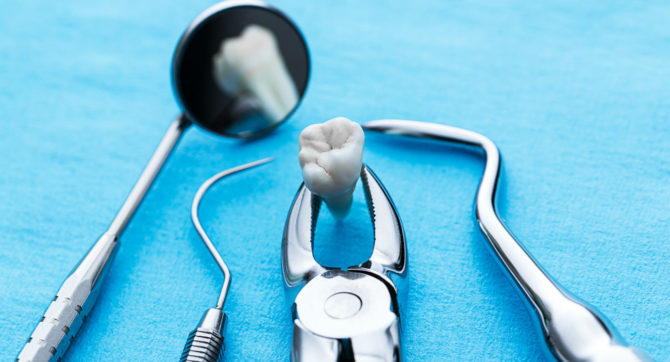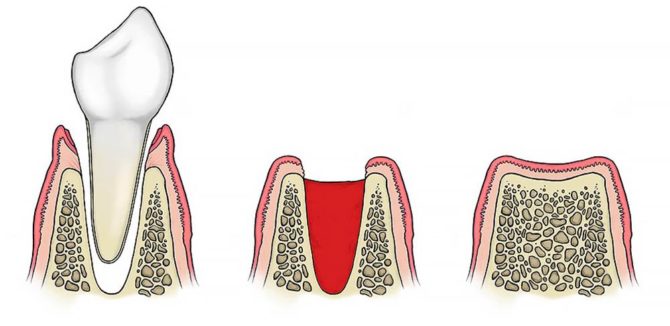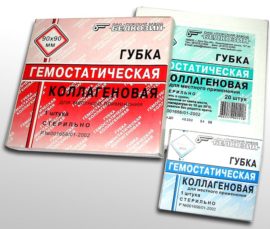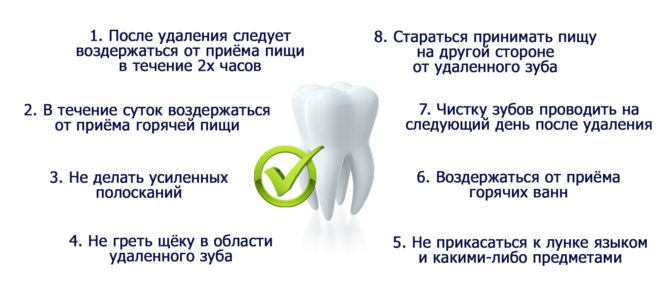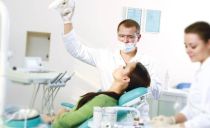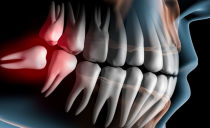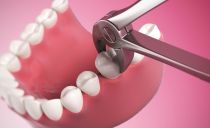What should be done after tooth extraction: what can and cannot
Tooth extraction is a complete surgical operation and significant stress for the whole body. Especially if the process was complicated, or it was preceded by inflammation. Typically, dentists inform patients about what they should do after they have their teeth removed, even before the removal procedure. Follow the doctor's recommendations without fail, as it depends on how quickly the open wound in the oral cavity heals.
Content
What to do immediately after removal
A responsible approach to gum healing is necessary, even if the staggering baby teeth are removed. And even more so when it comes to complex dental cases in adults. The patient will be told what to do after tooth extraction in order to prevent inflammation and suppuration in the hole, and how to respond to heavy bleeding and pain. These recommendations must be followed from the first minutes.
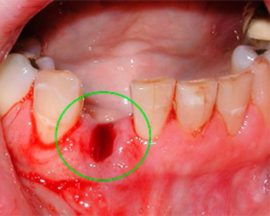 The hole from which the tooth has just been removed is a very vulnerable spot for infectious inflammation pathogens. Its natural protection is provided by a blood clot, which normally should form within a few hours - one day after extraction. It is very important not to interfere with this process.
The hole from which the tooth has just been removed is a very vulnerable spot for infectious inflammation pathogens. Its natural protection is provided by a blood clot, which normally should form within a few hours - one day after extraction. It is very important not to interfere with this process.
Care for the hole begins with the timely removal of the gauze swab with which it is covered. When the swab is thoroughly saturated with blood and saliva, it no longer fulfills its barrier and hemostatic function, but becomes the habitat of pathogenic microbes. In addition, if the gauze ball is overexposed, it will dry to the wound, and when it is pulled out, a person will destroy the resulting clot. This can lead to repeated bleeding and increase the healing time. Therefore, the doctor who pulls out the tooth will advise you to remove the tampon after 20 minutes, carefully moving it to the side.
What to do at home
At this point, if the operation was uncomplicated, the blood will already stop or will be released a few more hours after pulling out, but in a small amount. In order not to disturb blood clots in the tooth hole, you will have to refrain from eating in the first two hours. You can drink water, but only in a small amount and cool temperature. During the first day, the food should be soft and in no case hot.
To reduce pain after tooth extraction, compresses can be made. When you get home, apply a cooling compress to the cheek in the area of amputation to prevent swelling. To do this, you can use ice, products from the freezer of your home refrigerator, but any cold object should be wrapped in cloth.
You need to hold the compress for about five minutes, then you should take a 10-minute break and apply it again - and so on several more times. The decongestant effect of the cooling compress will strengthen a single dose of the drug for allergies: Suprastin, Diazolin.
Ingestion of blood in small quantities is not dangerous, but it is necessary to monitor the nature of the bleeding. If it is too strong, does not stop or resumes after some time, is accompanied by a throbbing sharp pain in the place where the tooth was pulled out, the causes of this phenomenon may be:
-
damage to soft or bone tissue due to difficult tooth extraction or illiterate work of a dental surgeon;
- inflammatory or purulent process in the gum before removal: cyst, abscess;
- hypertension;
- chronic diseases causing bleeding disorders;
- taking blood thinners on the eve of surgery.
It is necessary to act depending on the cause: in case of high pressure, take a hypotensive agent, in case of chronic pathologies, appropriate medications. A hemostatic sponge or sterile bandage soaked in 3% hydrogen peroxide can be applied to the bleeding area of the gum.
Continuous bleeding will require a second visit to the dentist to prescribe hemostatic drugs, electrocoagulate damaged vessels or suture, remove possible fragments in the soft tissues.
When the time of the anesthetic expires, severe pain will return, which the doctor also warns the patient about. To relieve pain in dentistry, painkillers are used: Tempalgin, Ketanov, Ibuprofen. With an increase in pain and a general deterioration in well-being: fever, swollen lymph nodes, intoxication, emergency medical assistance is needed to prevent sepsis.
What can not be done after tooth extraction
Rinsing is the most common way to relieve inflammation in the mouth. But just after tooth extraction it is strictly forbidden to rinseotherwise, clot formation will have to wait a very long time. If the gum is severely inflamed, it is permissible to make baths with soda solution, Furacilin, Dioxidin, a decoction of chamomile, yarrow or oak bark. To do this, a small amount of liquid must be collected in the mouth and gently held for several minutes at the site of inflammation.
Do not brush your teeth in the first hours after surgery. By the end of the first day from the moment the tooth was pulled out, it is not forbidden to do this, but the place of the broken gingival cover should be circumvented. The next day, when the hole from which the tooth was pulled out is already protected by a clot, you can begin to carefully brush the teeth around it.
The main thing that absolutely can not be done after tooth extraction is to apply warming compresses and warm the cheeks and oral cavity by any other means. A hot bath, a bath and a sauna are also prohibited. Damaged tissues must not be disturbed in any way: touch the hole with your fingers or objects, remove the protective clot yourself.
Do not take alcohol after tooth extractionwhich is able to increase bleeding and is incompatible with most painkillers and antibiotics. In a normal situation, alcohol is prohibited on the first day, in the case of taking antibiotics - until the end of the course. In the first hours after a tooth is pulled out, it is in the patient's interest to abstain from smoking.
Another strict limitation is associated with self-medication with antibiotics. Whatever the situation after tooth extraction, the need for antibiotic therapy and the selection of drugs should be agreed with the doctor.
Prevention and prevention of complications after tooth extraction
To reduce the healing time of the hole and prevent the development of complications after tooth extraction, several factors must be taken into account:
- Do not go on tooth extraction on an empty stomach, this can complicate blood coagulation and cause hypoglycemia. No matter how strong the excitement before the operation, you need to force yourself to have breakfast two hours before the procedure. But if the extraction will be carried out under general anesthesia, you will have to do without food for at least five hours.
- It is better to plan the operation in the morning, so that there is time to see a doctor in unforeseen situations.
- It is better for a woman to refrain from surgery during critical days. During this period, bleeding from the hole can be difficult to stop.
- It is necessary to inform the doctor about an allergy to medications, as well as about medicines that were taken the day before or are taken systematically. The doctor should be informed of all serious pathologies in the body before he pulls out a tooth.
Inflammatory processes that occur in patients after they pull out their teeth develop most often as complications of diseases that led to the removal. Running caries, periodontal disease, flux, abscess, cyst - these conditions are accompanied by the destruction of dental tissues and the formation of pus, which also enters the cavity where the tooth was removed, which greatly complicates healing.

